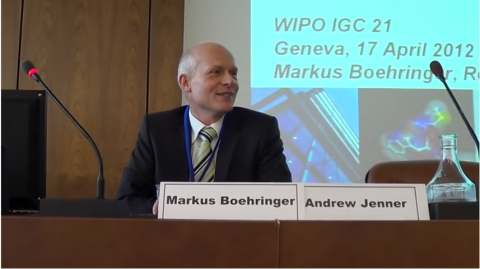IFPMA Statement, WHA 65, Item 13.14, Consultative expert working group on research and development: financing and coordination
Delivered by Mario Ottiglio, Associate Director, Public Affairs & Global Health Policy
Thank you on behalf of the International Federation of Pharmaceutical Manufacturers and Associations (IFPMA), for the opportunity to provide our perspective on this topic. We represent the global R&D pharmaceutical industry, whose primary contribution to global health is the development of innovative medicines and vaccines.
IFPMA commends the CEWG for the comprehensive and important work they have conducted. The report recognizes the need to stimulate R&D into type II and III diseases where funding is underserved. Additionally, it identifies the relevance of coordination and provides a basis for discussion on increased financing into these disease areas. We congratulate the CEWG for their bold and welcome their conclusion that a potential convention would be a supplementary instrument to address challenges that cannot be fully tackled trough the current innovation paradigm.
Against this background, our member companies’ R&D programs for these diseases have increased over the last years with an overall 93 projects in 2011. 3/4 of these were developed through collaborative approaches. Additionally, our industry is thinking creatively about how to conduct further R&D: one recent example is the active contribution of know-how and intellectual property by several companies to the WIPO Re:Search.
In the race against these diseases many hurdles need to be overcome.
As a leading partner in R&D, we observe that most of the existing projects are in relatively early stages; there is need for more funding to start new research or ensure funding levels are appropriate as projects progress into clinical trials. Furthermore, more attention should be placed on clinical trials and regulatory infrastructures in developing countries – where the trials may have to take place –and which will have to review any future products.
The question we need to answer is how to proceed forward.
The CEWG has produced a landmark report containing a number of interesting proposals and has also identified occasions where data and co-ordinating mechanisms are lacking.
This is a massive undertaking.
It is important that member states take the appropriate time to fully evaluate all the available options the report has highlighted and find a collaborative way to go forward.
Discussions should account for the complexity and ongoing evolution of the pharmaceutical innovation paradigm. Any successful model should consider the need for prioritization, effectiveness, and sustainability, with an aim to increase innovation and improve access to high quality, safe, and effective medicines for these diseases.
Industry stands ready to share its expertise to assist further R&D efforts which are crucial to achieve our shared commitment to innovation and access to medicines for these diseases.












